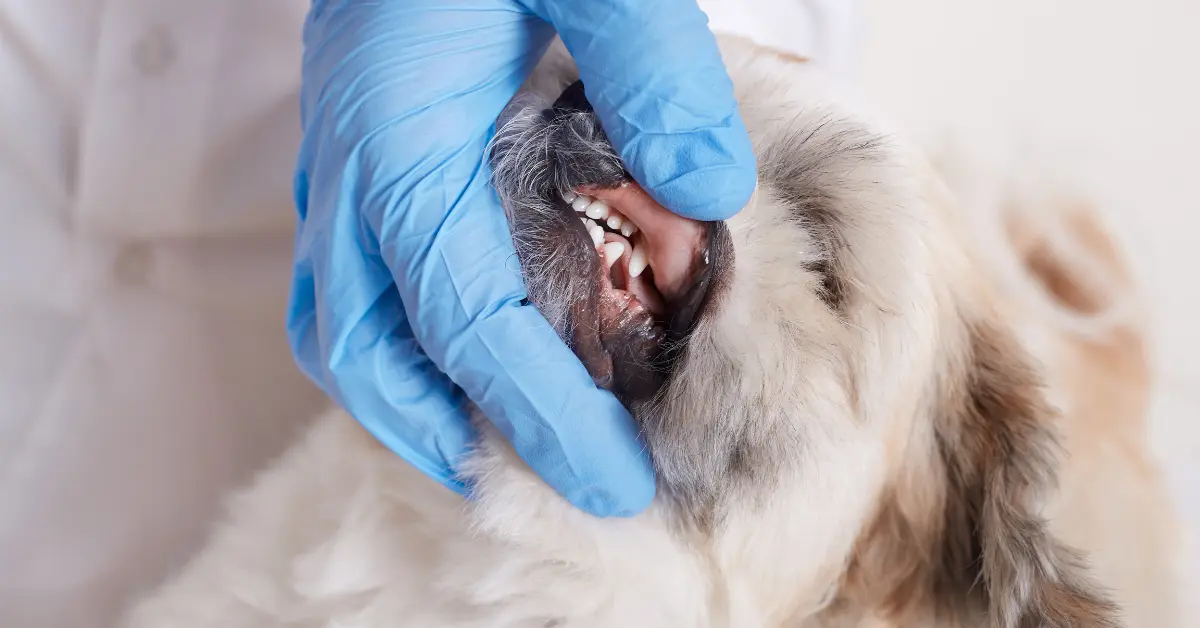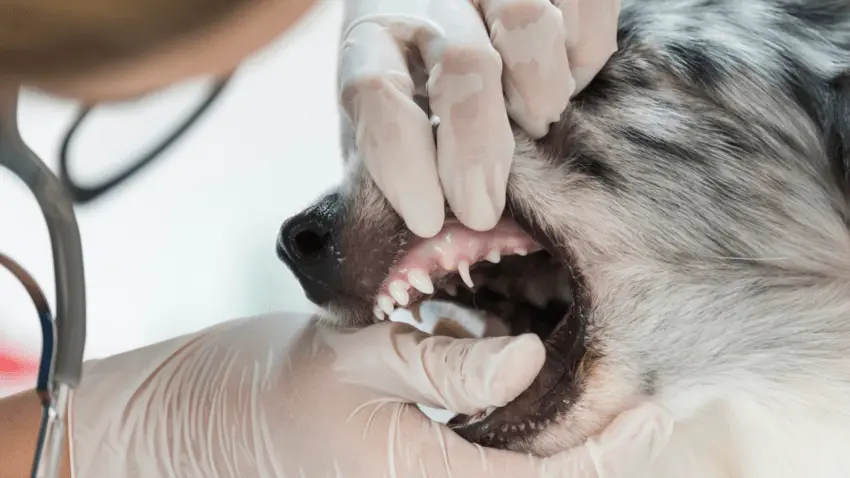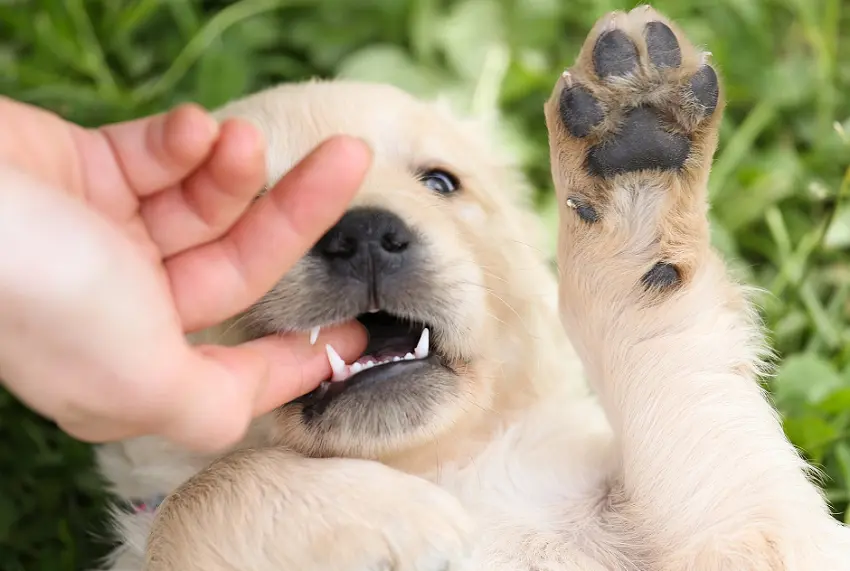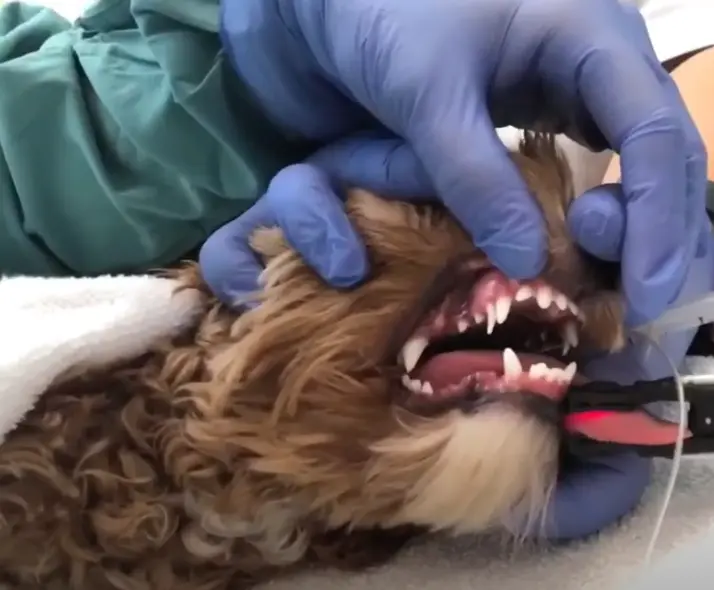Retained Puppy Teeth: How Long To Wait Before Calling The Vet
Like humans, dogs get two sets of teeth. However, many pet owners are asking: retained puppy teeth how long to wait?
In this post, I will discuss a puppy’s teething process and what you need to do in case your dog’s baby teeth don’t fall off.

What are retained puppy teeth?

Like human babies, puppies are born without any teeth. By their third week of life, puppies’ first set of teeth will start to erupt, which are called deciduous teeth.
This process is necessary to give way to the pup’s permanent teeth. However, some puppies don’t fully shed their milk teeth, with a few getting stuck on their gums.
Take note that retained puppy teeth should be addressed right away with the help of a veterinarian. This is to prevent further dental problems as the retained teeth will impede the growth of the new biters. Please read here: Do Dog Teeth Grow Back
What happens if a puppy’s teeth are retained?

Puppy teeth retention is a big problem for a variety of reasons. The following are the issues that will occur if your puppy’s milk teeth get retained:
1. Abnormal jaw position
Retained teeth will cause an abnormal jaw position in dogs. This is because the permanent teeth are deprived of their position to erupt.
As your dog’s permanent teeth erupt with the puppy teeth, it will result in dental malocclusion. This condition happens when the lower and upper jaw doesn’t have normal lengths.
With this, the teeth will be in an improper alignment. Chewing and biting will be extremely difficult for canines with this condition.
2. Overcrowded teeth
Since the puppy teeth didn’t fall off, it will crowd with the permanent teeth. It can be combined with rotated teeth, which can be painful as the dog chews.
Overcrowded teeth in dogs can be treated at the vet’s clinic. Just take note that the approach varies, depending on the severity of the overcrowding and the specific position of the teeth.
3. Tooth abscesses
Retained deciduous teeth can fracture over time. The fracture will give way for infections to reach the root and trigger abscess.
This condition gets complicated as a dead deciduous tooth may have a permanent tooth underneath. It could cause an infection that isn’t easily seen from the surface.
4. Premature tooth decay
Retained puppy teeth will also result in premature tooth decay. This is because overcrowding makes it impossible for the dog’s teeth to be cleaned properly.
If not addressed early, your dog may lose all its teeth even before it reaches seniorhood. Aside from that, premature tooth decay will impact your dog’s ability to eat.
5. Periodontitis
Lastly, retained puppy teeth can result in an advanced case of periodontitis if not treated. This gum disease is painful and can result in a slew of secondary infections.
What should I do if my puppy’s teeth don’t fall out?
It’s important to monitor your puppy’s teething phase to ensure that its deciduous teeth are removed. If you notice any remaining milk teeth, you should consult your pet’s veterinarian.

The veterinarian will extract the retained milk teeth of your puppy. This way, the milk teeth won’t disrupt the natural growth of the permanent teeth.
Prompt consultation with the vet will spare your dog from the pain of retained puppy teeth. Also, it will save your pocket from expensive vet treatments due to dental complications.
So when are you supposed to call the vet? If your dog still has puppy teeth past the age of 6 months, you should bring them to the vet.
Overall, your dog should have 42 permanent teeth at six months. If your pet has more or there are unusually smaller ones, it’s a sign that there are retained teeth.
Never try to remove the puppy teeth on your own. Doing so will cause pain to your dog, not to mention that it can lead to infections and more problems.
How much does it cost to remove retained puppy teeth?

Extraction of retained puppy teeth costs an average of $250. However, worst cases will set back pet owners for thousands of dollars.
The severity of your dog’s dental condition will affect the cost of extraction. Also, your location and expertise of the vet will also add up to the bill.
Do puppy teeth turn black before falling out?
A puppy tooth turning black isn’t normal during the teething phase. This is a sign that your dog has tooth decay, infection, trauma, and other health problems.
Overall, a pup’s deciduous teeth will look like white crumbs when it falls off. If it has a black color, you should consult the vet immediately.
How do you fix a misaligned dog tooth?
Misaligned dog teeth are often extracted. In some cases, a vet may install an orthodontic device somewhat similar to human dental braces to help correct the tooth’s position.
Take note that if the misaligned tooth isn’t causing major problems, the vet may prefer not to do anything with it. In the end, treatment for misaligned dog teeth is on a case-to-case basis.
Is it normal for a 6-month-old puppy to lose teeth?
A 6-month-old puppy should have all its 42 permanent teeth in place. At this age, you may notice your pup still shedding its milk teeth.
Overall, natural removal of deciduous teeth at 6 months is still normal. However, any puppy teeth retained after that time should be extracted manually at the vet’s clinic.
Also, you should check whether your puppy is losing milk teeth or its permanent teeth. If your pup’s permanent teeth are falling off at 6 months old, you should consider it an emergency.
Is retained puppy teeth hereditary?
Breeders and experts believe that there’s a genetic predisposition to retained puppy teeth. With that, a dog with a history of retained puppy teeth will likely pass the defect to its litter.
While this isn’t absolute, many breeders noticed that retained puppy teeth tend to happen more on families of dogs. This is why you should ensure that you’re getting a pup from a legitimate breeder.
Conclusion
Retained puppy teeth, how long to wait? In general, you can wait up to 6 months before concluding that your pup has retained teeth.
Nevertheless, it’s still best to be proactive during your pup’s teething phase. Regular dental checks at the vet will help prevent retained teeth from causing serious problems.
